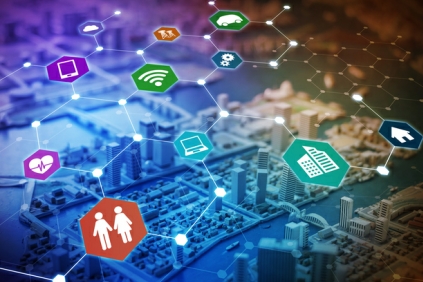From meatless meat to trustless trust – can Blockchain change the way that we work together to create knowledge in smart cities?
Smart Cities apply technology, connectivity and data to the urban experience, but they could easily become Fake Cities. Their factories still produce things – but they are staffed by robots. Their cars still take you where you want to go – but they are driven by autonomous systems. You can hold their digital products in your hands – but only via a smart phone.
In the worst case, Smart Cities trade down authentic human experiences for something artificial, virtual and ersatz. But can the Smart City ever trade-up and improve on the original?Take food as an example. Scientists are perfecting cultured cells to grow synthetic meat in laboratories. Far from producing an unpalatable substitute, the result is said to be nutritious and tasty. As the world’s population grows rapidly, meatless meat is seen as a carbon and resource efficient alternative that could represent “the future of food”.
In their recent report partners in the UnLoCK consortium considered whether Blockchain and Distributed Ledger Technologies could similarly transform another basic human need – by creating “trustless trust.”
But might this be needed?
The argument goes that Smart Cities join-up multiple systems, more than have ever been connected before. The scale and complexity of the resulting ecosystem means that not all participants can expect to have pre-existing relationships with each other. In this context, it is difficult to know who or what to trust.
The blockchain is seen as a way for Information to be securely shared between peers. The important point is that rather than investing trust in one privileged partner, such as a bank, the focus moves to collectively creating a trusted system; one where peers collectively own and update the Distributed Ledger as a single version of the truth.
The UnLoCK consortium partners identify numerous areas where they would like to experiment with the application of this technology, from understanding the environmental provenance of goods and services within supply chains associated with new local approaches to house building, to systems that afford ‘smart citizens’ greater ownership and control of their personal data.
The consortium partners are planning further discussions to explore how to move from theory towards a working prototype. For more details of the UnLoCK consortium contact, Lisa Kehoe Lisa.kehoe@bristol.ac.uk and Stephen Hilton stephen.hilton@bristol.ac.uk
--------------------------------------
This blog was written by Stephen Hilton, Director of Bristol Futures Global, and a University of Bristol Cabot Institute Fellow.
This blog was reposted with kind permission from PolicyBristol. View the original blog post.

